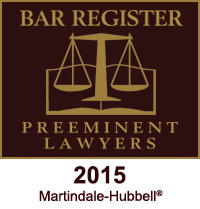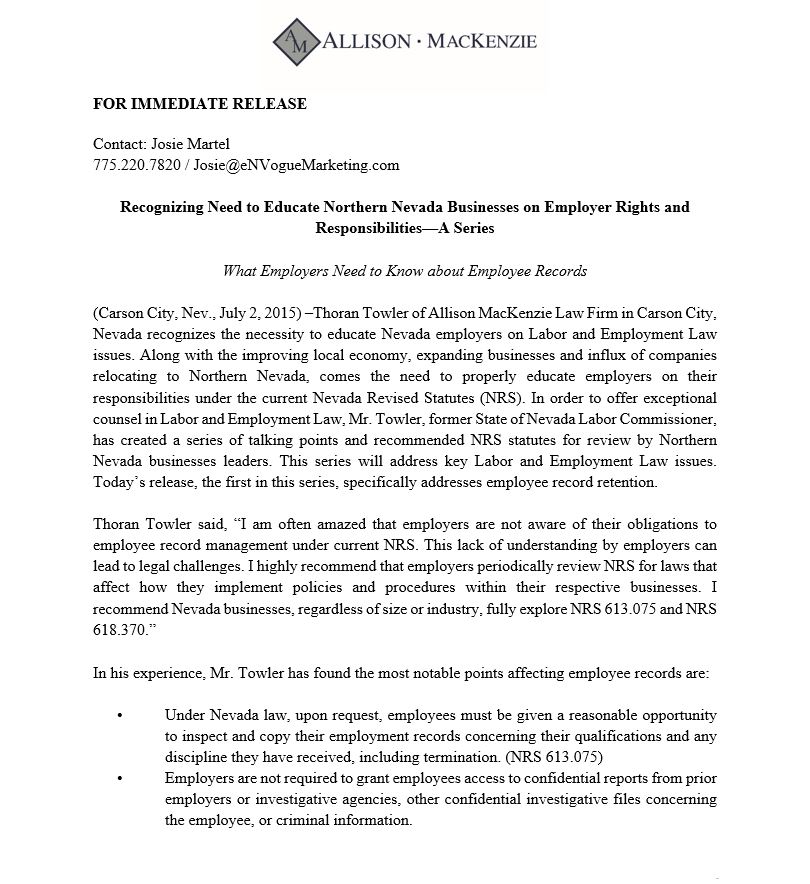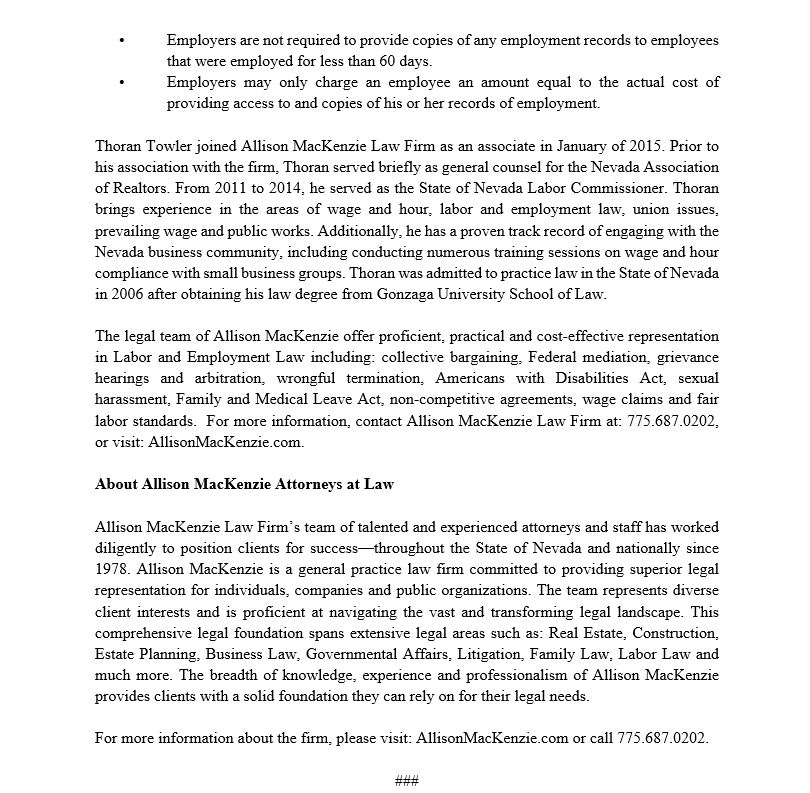Press Release: Recognizing Need to Educate Northern Nevada Businesses on Employer Rights and Responsibilities—A Series
Thoran Towler of Allison MacKenzie Law Firm in Carson City, Nevada recognizes the necessity to educate Nevada employers on Labor and Employment Law issues. Thoran has created a series of talking points and recommended NRS statutes for review by Northern Nevada businesses leaders. The first in an informational series, this release specifically addresses employee record retention.
For a downloadable pdf of the entire press release click here or image below.
By Mike Pavlakis, Allison MacKenzie, Ltd.
Ryan Russell has been re-elected to serve as Carson City’s representative on the State Bar of Nevada’s Board of Governors. The Board of Governors is comprised of 15 members representing the four state districts defined in Supreme Court Rule 81. Elections for the Board are held annually and governors are selected by the members of their districts to serve two-year terms.
The Board of Governors carries out the State Bar’s administrative functions, sets policies and procedures, affects rule changes, takes legislative positions relative to the administration of justice and oversees the Bar’s fiduciary responsibilities. Members are encouraged to contact their district representatives with concerns pertaining to the profession. The mission of the Board of Governors is to 1) govern the legal profession in the State of Nevada, subject to the approval of the Nevada Supreme Court; 2) aid in the advance of jurisprudence and in the improvement of administration of justice; 3) promote reform in the law and in judicial procedure; 4) uphold and elevate the standard of honor, integrity, and courtesy in the legal profession; 5) encourage higher and better education for membership in the profession; 6) promote a spirit of cordiality and true friendship among members of the Bar; and 7) manage the business of the State Bar in a prudent manner.
In his role as a member of the Board of Governors, Ryan serves on the Board’s Budget Committee as well as on the Board’s Personnel and Compensation Committee. Ryan also serves on the Board of Governor’s Standing Committee of Continuing Legal Education. Ryan is the liaison to the Business Law Section and Solo and Small Practice Section.
Ryan continues to serve on the Boys and Girls Club of Western Nevada’s Board of Directors as well, and continues his service as a Judge Pro Tempore. We have always been proud of the civic service our attorneys provide, and are proud that a member of our firm has earned re-election as Carson City’s representative on the State Bar’s Board of Governors.
In addition, Mr. Russell recently was named in Top 10 Family Law Attorneys in Nevada by the National Academy of Family Law Attorneys (“NAFLA”).
The NAFLA recognizes the top family law attorneys in each state with the intent of helping consumers select well-qualified professionals when legal representation is needed.
Candidates must be licensed, in good standing with their local bar association and nominated by a licensed practicing attorney. In addition, attorneys must have achieved meaningful professional recognition and earned the respect of their clients and peers. In the final stage of the NAFLA’s 4-step selection process, the Board of Governors reviews the finalists and selects the official award recipients from each state. The rankings are independent and free from commercial influence.
For more information about NAFLA, contact Kelly Kerr at 855-384-6285, or go to www.nafla.net.
By Jim Cavilia, Allison MacKenzie, Ltd.
Private property rights are among the most fundamental of rights in the United States. Private property ownership is central to the “American Way” and was a crucial part of our Founding Fathers’ inspired vision. Despite the importance of property rights to our heritage as citizens of this great country, those rights are not absolute. An individual’s right to use her real property as she wishes must be balanced with how that use impacts neighboring property owners and society as a whole. Generally, this balancing act is conducted by local government officials.
Within the framework of Nevada’s land use statutes, the local elected body (County Commission, City Council or Board of Supervisors) with the assistance of an appointed Planning Commission is charged with the responsibility of determining the compatibility of various land uses in relation to one another. This sort of local land use and zoning decision is a strange hybrid of a legal and a political decision. The decisions are legal in the sense that the decisions cannot be made arbitrarily or in such a way that so restricts a property owner’s use of the property that it amounts to a constitutionally prohibited “taking.” These decisions, however, are not purely legal like the action of a court, as the elected officials should properly consider the local sentiment as well as the compatibility of a particular use with current and historic uses of land in the geographic area.
Like any of our fundamental rights, including free speech and the exercise of religion, our private property rights are not absolute. Any planned use of real property must be considered in relation to its impact on neighboring land uses as well as its impact on the community generally. When preparing to have a particular land use matter considered, whether it is a special use permit for a commercial activity or a zone change to allow a previously prohibited use, it is imperative to approach the process as both a legal matter and a political matter. No matter how righteous and “legal” the proposed project or use is, ignoring the political realities of the local community will often result in a negative response from the elected body which will force the property owner to consider the very dubious and costly option of litigation.
If you have any questions or are interested in speaking with me about land use, please feel free to E-mail me at jcavilia@allisonmackenzie.com.
 Allison MacKenzie, Ltd. has been named one of the 2015 Top Ranked Law Firms by LexisNexis® Martindale-Hubbell®. Martindale-Hubbell® was asked to research their comprehensive database of over 1.2 million lawyers and firms in over 160 countries and identify U.S. law firms of 10 or more attorneys, where at least one out of three of their lawyers achieved the AV Preeminent® Peer Review Rating. This rating indicates the rated lawyer has been deemed by his or her peers to have demonstrated the highest level of ethical standards and legal ability.
Allison MacKenzie, Ltd. has been named one of the 2015 Top Ranked Law Firms by LexisNexis® Martindale-Hubbell®. Martindale-Hubbell® was asked to research their comprehensive database of over 1.2 million lawyers and firms in over 160 countries and identify U.S. law firms of 10 or more attorneys, where at least one out of three of their lawyers achieved the AV Preeminent® Peer Review Rating. This rating indicates the rated lawyer has been deemed by his or her peers to have demonstrated the highest level of ethical standards and legal ability.
 Additionally, Allison MacKenzie, Ltd. has been recognized for their legal expertise and professional stature by placement in the Martindale-Hubbell® Bar Register of Preeminent Lawyers™. For over 90 years, the Bar Register has been a unique guide to the legal community’s most eminent professionals. It includes only those select law practices that have earned the highest rating in the Martindale-Hubbell Law Directory and have been designated by their colleagues as preeminent in their field.
Additionally, Allison MacKenzie, Ltd. has been recognized for their legal expertise and professional stature by placement in the Martindale-Hubbell® Bar Register of Preeminent Lawyers™. For over 90 years, the Bar Register has been a unique guide to the legal community’s most eminent professionals. It includes only those select law practices that have earned the highest rating in the Martindale-Hubbell Law Directory and have been designated by their colleagues as preeminent in their field.
Martindale-Hubbell is the facilitator of a peer review rating process. Ratings reflect the anonymous opinions of members of the bar and the judiciary. Martindale-Hubbell® Peer Review Ratings™ fall into two categories – legal ability and general ethical standards. To learn more about Martindale-Hubbell Peer Review Ratings, please visit www.martindale.com/ratings.
By Thoran Towler, Allison MacKenzie, Ltd.
A common, but avoidable pitfall in any business is the classification of workers – independent contractor or employee. This blog entry seeks to clarify the distinction between employees and independent contractors and to serve as a helpful guide in making this very important determination.
An independent contractor is a self-employed person who agrees with a client to complete work for a fee according to the means or methods of the self-employed person. The self-employed person is not subject to the supervision or control of the client, except as to the result of the work. A good example of this type of scenario is the relationship between a contracted cleaning company and a law firm. A law firm will often contract out the work of cleaning the offices to an independent cleaning company. These cleaners usually come to the law firm after business hours, work without supervision and leave when they believe the work has been completed. The cleaners are obviously independent contractors. However, in regards to the other workers in the office (i.e. receptionist, office administrator, legal assistant, etc.) this same relationship does not exist. These workers are considered employees of the law firm, not independent contractors. Employers often want to know how to make the distinction between employee and independent contractor when the difference between the workers isn’t so clear.
The main distinction between employees and independent contractors is the level of control. The factors to be considered in understanding this distinction generally fall into three categories: behavior, financial, and relationship. Each factor must be weighed to determine the kind of relationship that exists and the liability of each party in that relationship. No factor is more important than any other. The relationship must be considered as a whole.
Behavior
Behavior refers to facts that show whether there is a right to direct or control how the work is done. This includes the type of instruction given (i.e. when and where to do the work, what equipment to use, etc.), the degree of instruction (how detailed are the instructions), evaluation (whether the work is evaluated based on how the work is performed versus the result), and training (if training to do the work is provided or not).
Financial
Financial refers to facts that show whether or not there is the right to control the economic aspects of the worker’s job. This includes the significance of the investment (whether the worker has to make a significant investment in the tools used to complete the work), unreimbursed expenses (expenses incurred regardless of whether work is currently being performed), the opportunity for profit or loss (the possibility of incurring a loss is directly tied to the work), services available to the market (whether the worker can pursue other work), and the method of payment (payment of hourly, weekly, or monthly wages versus a flat fee).
Relationship
Relationship refers to facts that show how the worker and business perceive their relationship to each other. This includes written contracts (how the parties have defined their relationship), employee-type benefits (whether the worker receives insurance, retirement, vacation, etc.), permanency of the relationship (whether the employment is project-specific or for an indefinite period of time), and services provided key to the business (whether the work becomes part of/owned by the business or not).
Why is this determination important? There are very serious consequences if an employee is misclassified as an independent contractor with no reasonable basis for doing so. The most significant consequence is that the business may be liable for any and all employment taxes of that worker for the length of their employment (26 U.S.C. § 3509). There may also be penalties and fines assessed by the U.S. Department of Labor for failing to pay proper overtime compensation, unemployment insurance taxes or workers’ compensation premiums. Also, if the Nevada Labor Commissioner’s office finds that you misclassified employees, you are guilty of a misdemeanor.
Take some time to think about how you interact with the independent contractors you encounter in your professional life and be mindful of the level of control. The level of control exerted is a primary factor a court will look at if you find yourself defending a claim for misclassification.
If you have any questions or are interested in speaking with me about independent contractors, please feel free to E-mail me at ttowler@allisonmackenzie.com.
By Joan Wright, Allison MacKenzie, Ltd.
The Nevada Revised Statutes (NRS) require that every corporation have a Registered Agent who resides or is located in the State (NRS 78.090) and that every limited liability company have a Registered Agent with a street address for the service of process which is the registered office of the company in this State (NRS 86.231). Nevada adopted the Model Registered Agents Act in 2007 and it is Chapter 77 of the NRS applicable to Registered Agents for both corporations and limited liability companies. There are two types of Registered Agents: Commercial Registered Agents and Noncommercial Registered Agents. A Commercial Registered Agent must make annual filings with the Nevada Secretary of State and maintain certain information on file with that office. Allison MacKenzie, Ltd., is a Commercial Registered Agent.
A Registered Agent is required under NRS Chapter 77 to forward to the represented entity any process, notice or demand served on the agent on behalf of its client; and to provide the notices of any change in the Registered Agent’s name, address or type or jurisdiction of organization or if it has elected to cease being in the business of acting as a Registered Agent.
With respect to any particular corporate client, the Registered Agent is required to keep in its file: a certified copy of the Articles of Incorporation and all amendments thereto; a copy of the corporate bylaws certified as accurate by an officer of the corporation, and all amendments thereto; and a stock ledger or duplicate stock ledger, revised annually, containing names alphabetically arranged, of all persons who are stockholders, their place of residence, if known, and the number of shares held by them OR a duplicate stock ledger, and the present and complete mailing or street address where the stock ledger or duplicate stock ledger is kept.
The corporation can be fined if the records specified are not kept by the Registered Agent or provided to stockholders who make a proper request during business hours. A reasonable fee for making copies may be charged. An affidavit to the effect that the inspection of corporate records is not desired for a purpose which is in the interest of a business or object other than the business of the corporation and that the stockholder or other person has not at any time sold or offered for sale any list of stockholders of any domestic or foreign corporation or aided or abetted any person in procuring any such record of stockholders for any such purpose may be required before records are inspected.
Registered Agent for any particular limited liability client which does not maintain an office in Nevada for its records shall keep a statement setting out the name of the custodian of the information required by statute to be kept in the State including the custodian’s complete address, with street and number.
What does Allison MacKenzie, Ltd. Do as Registered Agent?
In addition to the minimum statutory requirements set out above in summary form, Allison MacKenzie, Ltd. also forwards all first class mail received for the entity as requested by the client and assures that annual filings by the client comply with the client’s organizational documents and the requirements of law. Allison MacKenzie, Ltd. provides a meeting space for clients to hold their annual meeting or special meetings.
If you have any questions or are interested in speaking with me about Registered Agents, please feel free to E-mail me at jwright@allisonmackenzie.com.
Volunteer Attorneys for Rural Nevadans (VARN) has recognized Joan C. Wright as Outstanding Volunteer for her service to the 2014 Pro Bono Project. Joan participated in the Lawyer in the Lobby program set up by VARN which allows citizens to sit down with an attorney for a short amount of time and have questions answered at no charge to them.
Joan Wright has been in practice in Nevada since 1979 and has concentrated her work in real estate law, resort timeshares, community associations, secured transactions, secured creditors (bankruptcy), easements and quiet title. She received her undergraduate degree from the University of California at Berkeley and her law degree from the University of the Pacific, McGeorge School of Law.
By Dawn Ellerbrock, Allison MacKenzie, Ltd.
The importance of a health care power of attorney form and a living will declaration as part of your overall estate plan cannot be overemphasized.
A power of attorney form for health care decisions allows you to name someone to act on your behalf for the purpose of making medical decisions if you are unable to make informed decisions for yourself. The Nevada Legislature has enacted a statutory form entitled “Durable Power of Attorney for Health Care Decisions” at NRS 162A.860. Nevada’s Durable Power of Attorney for Health Care Decisions authorizes the named attorney-in-fact to consent to medical procedures on your behalf if you are unable to give informed consent. Nevada’s Durable Power of Attorney for Health Decisions, however, does not authorize the named attorney-in-fact to consent to such things as convulsive treatment, psychosurgery, or your commitment or placement in a facility for treatment of mental illness. A court order is needed for these types of medical decisions.
With respect to decisions to withhold or withdraw life-sustaining treatment, Nevada’s Durable Power of Attorney for Health Care Decisions sets forth five different statements of desire. If you agree with the statements of desire, then you would initial the statement. The five statements are as follows:
- I desire that my life be prolonged to the greatest extent possible, without regard to my condition, the chances I have for recovery or long-term survival, or the cost of the procedures.
- If I am in a coma which my doctors have reasonably concluded is irreversible, I desire that life-sustaining or prolonging treatments not be used. (Also should utilize provisions of NRS 449.535 to 449.690, inclusive, if this subparagraph is initialed.)
- If I have an incurable or terminal condition or illness and no reasonable hope of long-term recovery or survival, I desire that life-sustaining or prolonging treatments not be used. (Also should utilize provisions of NRS 449.535 to 449.690, inclusive, if this subparagraph is initialed.)
- Withholding or withdrawal of artificial nutrition and hydration may result in death by starvation or dehydration. I want to receive or continue receiving artificial nutrition and hydration by way of the gastrointestinal tract after all other treatment is withheld.
- I do not desire treatment to be provided and/or continued if the burdens of the treatment outweigh the expected benefits. My agent is to consider the relief of suffering, the preservation or restoration of functioning, and the quality as well as the extent of the possible extension of my life.
Admittedly, the language used in the foregoing statements is confusing. Unfortunately, Nevada law mandates that this language be used. It is advisable that you review the statements of desire with your doctor or attorney if you should have any questions.
Additionally, if you agree with the items 2 and 3 of the statements of desire regarding end-of-life decisions, Nevada law encourages the use of a Living Will Declaration.
A Living Will Declaration goes with the Durable Power of Attorney for Health Care Decisions. If the persons you have named as your attorneys-in-fact are unable or unwilling to make end-of-life decisions on your behalf, the Living Will Declaration authorizes your attending physician to make such decisions for you.
If you have any questions or are interested in speaking with me about a Durable Power of Attorney for Health Care Decisions and Living Will Declaration, please feel free to E-mail me at dellerbrock@allisonmackenzie.com
 Charles P. Cockerill joined Allison MacKenzie Law Firm on November 1st, 2014. With over 20 years of practice exclusively in the area of Labor and Employment Law, Charlie brings a wealth of knowledge and proficiency representing employers including cities, counties, school districts, hospitals, public communications utilities, and others. Further, Charlie is an arbitrator for the Nevada District Court Alternative Dispute Resolution (ADR) program and a State of Nevada Hearings Officer in matters involving employee discipline and discharge. In his free time, Charlie enjoys spending time with family and friends, traveling, snowboarding and golfing. Charlie is taking the lead in expanding the firm’s practice in Labor and Employment Law for both the public and private sector employers including: collective bargaining, Federal mediation, grievance hearings, arbitration and appeals, wrongful termination, Americans with Disabilities Act, sexual harassment, Family and Medical Leave Act, non-competitive agreements, wage claims and fair labor standards.
Charles P. Cockerill joined Allison MacKenzie Law Firm on November 1st, 2014. With over 20 years of practice exclusively in the area of Labor and Employment Law, Charlie brings a wealth of knowledge and proficiency representing employers including cities, counties, school districts, hospitals, public communications utilities, and others. Further, Charlie is an arbitrator for the Nevada District Court Alternative Dispute Resolution (ADR) program and a State of Nevada Hearings Officer in matters involving employee discipline and discharge. In his free time, Charlie enjoys spending time with family and friends, traveling, snowboarding and golfing. Charlie is taking the lead in expanding the firm’s practice in Labor and Employment Law for both the public and private sector employers including: collective bargaining, Federal mediation, grievance hearings, arbitration and appeals, wrongful termination, Americans with Disabilities Act, sexual harassment, Family and Medical Leave Act, non-competitive agreements, wage claims and fair labor standards.
By Mike Pavlakis, Allison MacKenzie, Ltd.
The relationship between landlord and tenant is an important one, and should be documented by a written rental agreement signed by both of the parties.
The rental agreement should identify the premises (the apartment, unit, house, or other property) which is the subject of the rental agreement, and it should include at least the following:
- The commencement date that the rental agreement begins; the date that the tenant can take occupancy of the premises, and the date the rental agreement ends;
- The amount of the monthly rent; the date the rent is due, and the place it is to be paid; typically, rents are paid in advance;
- The amount of any late charge if the rent is not paid when due;
- The amount of any security deposit; when it is to be paid, and whether the security deposit is refundable at the end of the term of the rental agreement, with or without interest;
- The utilities and services, if any, provided by the landlord, and the utilities for which the tenant is responsible; in residential tenancies, the landlord typically provides water and sewer service and perhaps trash removal and the tenant is responsible for electricity, heat, phone, internet service;
- The names of the tenants who will occupy the unit and who are responsible for the rent; and if any pets are allowed, the number and type of pet;
- The name, address, and contact information of the landlord in case of emergencies;
- The responsibility for the payment of taxes and insurance;
- The process for renewal of the rental agreement.
In addition, it is important for the parties to conduct a “walk through” of the unit prior to the tenant taking occupancy. Any deficiencies, such as carpet burns, holes in walls, broken windows, window coverings, scratched fixtures and appliances, and any work to be done by the landlord should be noted. Ideally, photographs of the condition of the unit will be taken. These should be dated and if necessary compared to the results of a “walk through” inspection of the unit upon termination of the rental agreement.
Standard forms of rental agreements are available in office supply stores and online. If you need help in preparing or reviewing your rental agreement, please call one of our attorneys. A well documented landlord tenant relationship will help insure a mutually satisfactory relationship and help avoid problems upon termination of the term of the agreement.
If you have any questions or are interested in speaking with me about written rental agreements, please feel free to E-mail me at mpavlakis@allisonmackenzie.com








